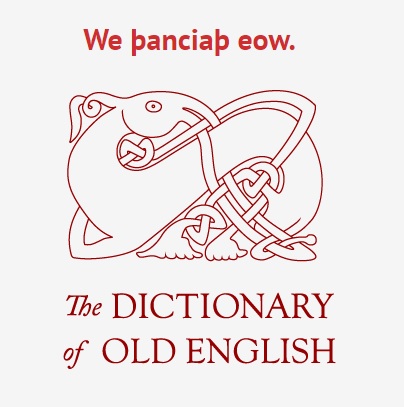Old Engli.sh
The Portal to the Language of the Anglo-Saxons
Read another, randomly chosen, past Old-Engli.sh News article:
Lo! Dictionary of Old English unveils lovely Old English Words in L
February 2023
January 2022
Dictionary of Old English Continues Work in spite of Pandemic
The Dictionary of Old English (DOE) 2020 progress report has been published. It showcases the DOE's achievments, which are all the more impressive given the challenges associated with the COVID-19 pandemic. Notable updates concern words starting with the letter L as well as new staff members and funding. |  Logo of the DOE's Adopt-a-Word funding campaign with the Old English for "We thank you." |
The DOE continues its progress to document the entire vocabulary of Old English. Work is progressing well for the letter L, in particular for entries beginning with la-, læ- and le-. These include lār 'teaching' and leornian 'to learn' - words especially congenial for high-profile scholars like those working at the DOE. Some other high-frequency items include laþian 'to invite, summon', lǣtan 'to let', lǣfan 'to leave', lencten 'spring, Lent', and lēoma 'radiance, ray of light', as well as their various derivatives. 2021 will see continued work on important L-words such as lēas 'false' and lāþ 'hateful' or lēof 'dear' and lēoht 'light.'
Funding efforts for the DOE saw some success in 2020. The project was awarded a significant grant from the Social Sciences and Humanities Research Council of Canada. It will provide the funding for a two-year postdoctoral researcher position. The DOE also created the Adopt-a-Word Campaing, a chance for individuals to donate money to the project in exchange for their favourite Old English word. Words that were adopted in 2020 include gefēa 'joy' and bēor 'beer.'
Another important achievment in 2020 was the publication of a collection of essays by outstanding scholars of Anglo-Saxon, such as Robert Getz and Stephen Pelle, the current DOE editors, Andy Orchard, Roberta Frank or Christopher A. Jones. The volume, entitled Old English Lexicology and Lexicography, is dedicated to Antonette diPaolo Healey, the long-time editor of the DOE, who retired in 2014.
All in all, the DOE team had a successful year 2020, proving that not even a global pandemic is capable of stopping their determination to complete the documentation of the entire Anglo-Saxon vocabulary.
Funding efforts for the DOE saw some success in 2020. The project was awarded a significant grant from the Social Sciences and Humanities Research Council of Canada. It will provide the funding for a two-year postdoctoral researcher position. The DOE also created the Adopt-a-Word Campaing, a chance for individuals to donate money to the project in exchange for their favourite Old English word. Words that were adopted in 2020 include gefēa 'joy' and bēor 'beer.'
Another important achievment in 2020 was the publication of a collection of essays by outstanding scholars of Anglo-Saxon, such as Robert Getz and Stephen Pelle, the current DOE editors, Andy Orchard, Roberta Frank or Christopher A. Jones. The volume, entitled Old English Lexicology and Lexicography, is dedicated to Antonette diPaolo Healey, the long-time editor of the DOE, who retired in 2014.
All in all, the DOE team had a successful year 2020, proving that not even a global pandemic is capable of stopping their determination to complete the documentation of the entire Anglo-Saxon vocabulary.
- Read the full Dictionary of Old English 2020 Progress Report
- Find more OE news at www.oenewsletter.org